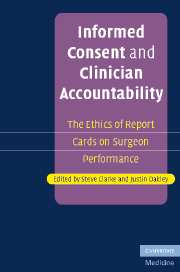Book contents
- Frontmatter
- Contents
- List of contributors
- Acknowledgements
- Introduction: Accountability, informed consent and clinician performance information
- Part I Accountability
- Part II Informed consent
- Part introduction
- 7 Informed consent and surgeons' performance
- 8 The value and practical limits of informed consent
- 9 Against the informed consent argument for surgeon report cards
- 10 Trust and the limits of knowledge
- 11 Surgeons' report cards, heuristics, biases and informed consent
- 12 Report cards, informed consent and market forces
- Part III Reporting performance information
- Index
- References
8 - The value and practical limits of informed consent
Published online by Cambridge University Press: 08 August 2009
- Frontmatter
- Contents
- List of contributors
- Acknowledgements
- Introduction: Accountability, informed consent and clinician performance information
- Part I Accountability
- Part II Informed consent
- Part introduction
- 7 Informed consent and surgeons' performance
- 8 The value and practical limits of informed consent
- 9 Against the informed consent argument for surgeon report cards
- 10 Trust and the limits of knowledge
- 11 Surgeons' report cards, heuristics, biases and informed consent
- 12 Report cards, informed consent and market forces
- Part III Reporting performance information
- Index
- References
Summary
Introduction
Obtaining informed consent from patients and research subjects is often seen as an impossible goal. Practical difficulties abound in the disclosure of information, the processing of information and with patient understanding of information. Some people view these practical difficulties as limitations of informed consent. These difficulties and perceived limitations are some of the objections appealed to when it is suggested that patients offered surgery should have access to information about individual clinicians' performance (Clarke, this volume; Clarke and Oakley, 2004). In this chapter I outline the requirements for informed consent and comment on the moral authority of informed consent. I then outline recent influential criticisms of informed consent by Onora O'Neill and Carl Schneider and assess the main practical limitations these authors identify. Based on this assessment, I argue that the practical difficulties can be dealt with – they do not rule out the possibility of informed consent. Instead of practical difficulties, major impediments to achieving informed consent are the result of a failure to adequately value patient autonomy (the value underlying informed consent) and relying on an impoverished or underdeveloped view of autonomy. I argue that a proper understanding of informed consent and patient autonomy clarifies the ethical obligations of health care professionals. A proper understanding of informed consent and patient autonomy also shows us that there is an ethical obligation to provide information about individual clinicians' ability to perform an intervention. I conclude by considering the effect on the doctor–patient relationship of providing information about clinician performance.
- Type
- Chapter
- Information
- Informed Consent and Clinician AccountabilityThe Ethics of Report Cards on Surgeon Performance, pp. 134 - 146Publisher: Cambridge University PressPrint publication year: 2007
References
- 1
- Cited by



